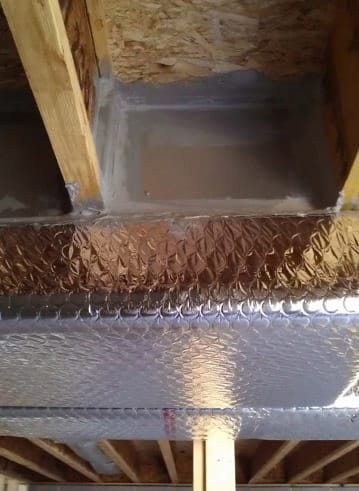
How Expensive Are Air Duct Leaks?
You could be wasting 20% of the cost to heat or cool your home! That’s what an air duct leak can do to your power bill, according to Energy Star.
Are Air Duct Leaks Costing You Money?
Where Do Duct Leaks Usually Occur?
What’s the Best Way to Seal a Duct Leak?
Should I Hire a Professional HVAC Contractor?
Are Air Duct Leaks Costing You Money?
In most homes, the ductwork runs behind the walls and through attics, crawl spaces and basements, so you likely never think about it. But leaks let conditioned air (heated or cooled) escape into those unused spaces rather than making it to the air vents where the air would be evenly distributed throughout the living areas of your home.
Your heating and air conditioning system is designed to cycle the same amount of air, removing it (return), conditioning it, then sending it back inside (supply). When conditioned air leaks into an attic or crawlspace on the supply route from conditioner to living space, a vacuum develops in the house. Unconditioned air (too hot or cold) enters to eliminate the vacuum. Sources of unconditioned air may include back drafting down chimneys or contaminated air and dust from crawlspaces and attics. If you notice a very fine dust that looks like the insulation in your attic, you may have a duct leak.
Air can also escape from the ductwork on the return (suction) route, the path from inside your home to the conditioner. These leaks increase the burden and lower the efficiency of your air conditioning (heating or cooling) system by forcing it to treat dusty outside air that is hotter or colder than previously conditioned interior air.
Where Do Duct Leaks Usually Occur?
Duct leaks and gaps usually occur around the ductwork seams and connections. However, leaks can occur anywhere, including in areas that aren’t easy to inspect.
Can Duct Tape Fix a Leak?
Taping the leaks you can locate is only a short-term fix. Over time, temperatures inside the ductwork cause tape to lose its ability to adhere.
What’s the Best Way to Seal a Duct Leak?
The most effective way to seal a duct leak is to hire a professional to repair it with “mastic,” which resembles a thick, gooey paint-like substance.
Should I Hire a Professional HVAC Contractor?
If you know or suspect you have ductwork leaks, a professional contractor like Fitch Services can perform each task recommended by Energy Star, listed below.
• Inspect the whole duct system, including attic and crawlspaces.
• Evaluate the system’s supply and return air balance. Many systems have air return ducts that are too small.
• Repair damaged and disconnected ducts and straighten out flexible ducts that are tangled or crushed.
• Seal all leaks and connections with mastic, metal tape, or an aerosol-based sealant.
• Seal all registers and grills tightly to the ducts.
• Insulate ducts in unconditioned areas (like attics, crawlspaces, and garages) with duct insulation that carries an R-value of 6 or higher.
• Include a new filter as part of any duct system improvement. The contractor should evaluate air flow after repairs are completed.
• Ensure there is no backdrafting of gas or oil-burning appliances, and conduct a combustion safety test after ducts are sealed.
Fitch Services’ technicians are certified and experienced in HVAC installation and repair. They can locate and permanently repair all ductwork leaks in your supply and return.
If you’ve noticed higher energy bills, uneven heating and cooling between rooms, or lots of dust, schedule an appointment with Fitch Services in Charlottesville, Va. Call (434) 296-9980 or use our contact form. We will perform an inspection and advise you on the next steps to take to make your home more comfortable and improve the air quality by eliminating duct leaks in your home.




